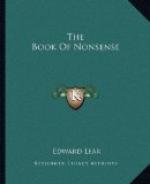Only those who have travelled with him could know what a delightful comrade he was to men whose tastes ran more or less parallel to his own. It was not everybody who could travel with him; for he was so irrepressibly anxious not to lose a moment of the time at his disposal for gathering into his garners the beauty and interest of the lands over which he journeyed, that he was careless of comfort and health. Calabria, Sicily, the Desert of Sinai, Egypt and Nubia, Greece and Albania, Palestine, Syria, Athos, Candia, Montenegro, Zagori (who knows now where Zagori is, or was?), were as thoroughly explored and sketched by him as the more civilized localities of Malta, Corsica, and Corfu. He read insatiably before starting all the recognized guide-books and histories of the country he intended to draw; and his published itineraries are marked by great strength and literary interest quite irrespectively of the illustrations. And he had his reward. It is not any ordinary journalist and sketcher who could have compelled from Tennyson such a tribute as lines “To E.L. on his Travels in Greece":—
“Illyrian woodlands,
echoing falls
Of water, sheets
of summer glass,
The long divine
Peneian pass,
The vast Akrokeraunian walls,
“Tomohrit, Athos, all
things fair,
With such a pencil,
such a pen,
You shadow forth
to distant men,
I read and felt that I was
there.”
Lear was a man to whom, as to Tennyson’s Ulysses,
“All experience is an
arch wherethrough
Gleams that untravelled world.”
After settling at San Remo, and when he was nearly sixty years old, he determined to visit India and Ceylon. He started once and failed, being taken so ill at Suez that he was obliged to return. The next year he succeeded, and brought away some thousands of drawings of the most striking views from all three Presidencies and from the tropical island. His appetite for travel continued to grow with what it fed upon; and although he hated a long sea-voyage, he used seriously to contemplate as possible a visit to relations in New Zealand. It may safely, however, be averred that no considerations would have tempted him to visit the Arctic regions.
A hard-working life, checkered by the odd adventures which happen to the odd and the adventurous and pass over the commonplace; a career brightened by the high appreciation of unimpeachable critics; lightened, till of late, by the pleasant society and good wishes of innumerable friends; saddened by the growing pressure of ill health and solitude; cheered by his constant trust in the love and sympathy of those who knew him best, however far away,—such was the life of Edward Lear.
—The London Saturday Review, Feb. 4, 1888.




